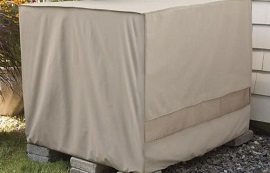As the temperatures begin to drop, you are likely to start considering getting prepared for winter. At this time of the year, almost everything needs to be covered up. From ourselves being wrapped up in scarfs and hats to putting frost blankets over plants or covering a boat, but should you cover up your outdoor HVAC unit? Your outdoor HVAC unit is not likely to see any use in winter as it is the air conditioner condenser, but many people worry about covering it. Here are just some of the reasons why covering your outdoor unit is a good idea.
Protect Against Debris:
Even in the mildest winters, pine needles, leaves, acorns, and other garden debris can accumulate. Outdoor air conditioner units can be vulnerable to these type of debris, not to mention sand, salt, and rain. Garden debris can allow moisture to enter the unit, could freeze and expand or encourage mold and mildew.
Minimize Storm Damage:
During stormy weather, heavy rain, hail or even tree branches can fall on your outdoor unit. This may chip paint, damage the casing or bend the grille fins. A cover can provide some protection to minimize storm damage, but it is also a good idea to ensure that garden foliage and branches are cut back in the immediate area to provide further protection.
The Benefits of Using a Cover:
The primary advantage of covering your outdoor unit over winter is that you can avoid the damage and clean up from the above scenarios. This can save you a great deal of time and frustration, but this is not the only benefits. You will find that if the condenser coil is kept clean, you can improve the energy efficiency of the appliance. This will reduce the operating costs and is likely to extend the lifespan of the appliance.
Choosing the Right Cover:
Once you have determined it is a good idea to cover your outdoor unit, you need to choose the right cover. Plastic coverings can trap moisture, encouraging mold, mildew, and rust. This is particularly problematic in sunny areas, when the winter temperatures will heat the air inside the cover, creating a moist, damp environment. Plastic can also provide an excellent shelter for insects and rodents, looking for a place to spend winter. Once these creatures are under the cover, they are likely to start exploring inside the appliance itself.
The ideal cover is made using breathable material. This will provide protection from the elements, but will also allow adequate ventilation to avoid moisture build up. Your owner’s manual should offer some suggestions for the right cover, or you can consult a professional HVAC specialist. You should also consider scheduling a spring service appointment, so you can ensure that the system is fully operational before you need it again. A spring service will allow any debris to be cleaned away, the fins are checked for damage and the unit is in good shape overall. You can then have confidence that your air conditioning will offer optimum efficiency and performance when you need it in the coming summer.
